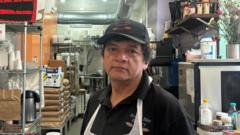The price of coffee in the United States is escalating sharply due to newly imposed tariffs, causing concerns among café owners and consumers alike. As prices for imported beans soar, coffee lovers are finding themselves tightening their belts, resulting in shorter queues for their morning fix.
Each year, Americans invest around $100 billion (£76 billion) in their coffee habits, but this trend could soon see a shift as tariffs impact consumer behavior. Jorge Prudencio, owner of Bread Bite Bakery in Washington DC, recently faced a price hike from his Colombian coffee supplier—one of many due to a recent 10% tariff imposed on coffee imports from various countries.
The U.S. is the globe's second-largest coffee importer, with Brazil and Colombia supplying most of the beans, according to the U.S. Department of Agriculture. Following the tariffs initiated on April 5, prices on coffee imports have been uprooted, leading to additional charges on local businesses. Prudencio acknowledged the need to raise prices for his customers to maintain his bakery's economic health, exclaiming, "Of course" when asked if he was worried about the rising costs.
Kamal Mortada, manager of Au Lait café, echoed similar sentiments, observing a decline in customer visits, attributing it to escalating prices stemming from inflation rates that peaked recently over the past years. Statistics revealed that ground coffee prices hit record highs in March 2025, increasing by more than $3 compared to March 2020. Mortada noted a shift in consumer habits—with more people opting for basic coffee rather than elaborate drinks, as menu prices surged by at least 25%.
Across the United States, coffee shop owners share these experiences. In San Francisco, Jenny Ngo of Telescope Coffee faces uncertain price hikes from her coffee roaster, anticipating prices to rise as she sources beans from Ethiopia and Guatemala, both impacted by tariffs. The price surge adds additional pressure on her business along with the rising costs of supplies such as iced coffee cups imported from China. “We unfortunately project to raise prices again in order to sustain our business,” Ngo stated.
Prudencio remains hopeful that coffee will retain its status as a cherished commodity, but he is wary about the simultaneous rise in prices of essential bakery ingredients, such as eggs. In just a few weeks, the price for a case of eggs soared from $42 when opening to over $100, highlighting the inflationary challenges affecting food supply and pricing.
The turmoil extends beyond just coffee, with Joel Finkelstein from Qualia Coffee Roasters also bracing for heightened bean prices that follow a long history of rising costs since the Trump administration's cut in funding to USAID, which provided support to South American coffee growers. Finkelstein expressed concern over declining sales, stating, “We are going to see a decrease in sales.”
As these tariffs reshape the coffee landscape in the U.S., both café owners and consumers fear what the future holds for a cherished daily ritual.
















